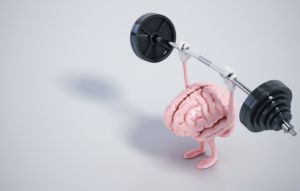Caffeine – it’s a daily ritual for so many of us – whether it’s that morning cup of coffee, a pre-workout boost, or an afternoon pick-me-up. It’s well known that caffeine has become the predominant go-to for enhancing energy, focus, and performance. But as much as it might feel like your best friend, could caffeine also hold you back?
From its quick-fix benefits to its potential long-term drawbacks, caffeine plays a complex role in men’s health. While it definitely can help you power through workouts, stay sharp at work, and even improve your mood, there’s a very fine line between using it wisely and overdoing it.
In this guide, we’ll dive into everything you need to know about caffeine – how it works, its effects on your body, and how to make the most of it without sacrificing your well-being. Whether you’re a devoted coffee drinker or just curious about its widespread impact, this guide will help you navigate the caffeine conversation a bit better.
The Science Behind Caffeine
Caffeine is not simply a jolt of energy – it’s a bit more complex than that. Caffeine is a powerful stimulant that directly affects your brain and body. When you consume caffeine, it rapidly enters your bloodstream and heads straight to your brain, where it blocks adenosine receptors – these are what are responsible for making you feel tired. By doing so, caffeine allows you to be more alert and focused.
Metabolization of caffeine also triggers the release of cortisol and adrenaline, two of your body’s primary stress hormones. Adrenaline, often called the “fight or flight” hormone, ramps up your heart rate, increases blood flow to your muscles, and sharpens your senses. At the same time, cortisol elevates blood sugar levels to provide a quick energy boost. This hormonal surge can be great for moments when you need a burst of energy, like a tough workout or a long day at work, but it can also come with a downside: repeated stimulation can lead to heightened stress, anxiety, and even burnout if not managed carefully.
The way caffeine affects you depends on several factors, such as your genetics, age, and daily habits. Some men metabolize caffeine quickly and can handle multiple cups a day, while others may feel jittery after just one. Additionally, caffeine’s effects can be amplified or diminished based on your tolerance, making it crucial to understand how your body uniquely responds.
To make the most of caffeine’s benefits without falling into the trap of overreliance, it’s essential to know some of the details of how this compound works.
The Benefits of Caffeine for Men
Caffeine has a range of legitimate benefits that can enhance physical and mental performance. If and when used wisely, it can offer us significant advantages.
Enhanced Physical Performance
One of the most well-known benefits of caffeine is its ability to improve physical performance. Studies show that caffeine can increase endurance, strength, and power output, making it a favorite among athletes and fitness enthusiasts. By stimulating the central nervous system and promoting the release of adrenaline, caffeine prepares your body to perform at its peak, whether you’re hitting the gym or running a marathon.
Improved Cognitive Function
Beyond its physical perks, caffeine is also known for its cognitive benefits. It helps boost alertness, focus, and concentration by blocking adenosine and increasing the release of neurotransmitters like dopamine and norepinephrine. This makes it an excellent tool for those long days at work, study sessions, or any activity that  demands mental sharpness.
demands mental sharpness.
Mood Elevation
Caffeine’s influence on mood is another big plus that many of us are probably aware of. By enhancing dopamine levels, caffeine can help improve mood and provide a mild euphoria, combating feelings of low mood or fatigue. So, it’s no surprise that so many men turn to caffeine for a mood boost during stressful or low moments.
Potential Weight Management Benefits
Caffeine may also play a role in weight management. It has been shown to increase metabolic rate and promote fat oxidation, making it easier to burn calories and potentially aiding in weight loss. Additionally, caffeine can, in some cases, help curb appetite and reduce cravings, potentially supporting a healthier approach to dieting.
While caffeine can offer these substantial benefits, it’s crucial to remember that its effects can vary greatly depending on the individual as well as the dose.
The Potential Downsides of Caffeine
While caffeine offers several benefits, it’s not without its potential downsides. Understanding these risks is crucial to using caffeine wisely and maintaining your overall health and well-being.
Impact on Sleep
One of the most significant drawbacks of caffeine is its impact on sleep quality. Caffeine has a half-life of about 5 hours on average, but can also commonly range from as little as 1.5 hours to as much as 9.5 hours, meaning it can stay in your system for much longer than most realize. Consuming caffeine too late in the day can disrupt your natural sleep-wake cycle, leading to difficulty falling asleep, lighter sleep, or even insomnia. Poor sleep can, in turn, affect mood, cognitive function, and overall health, often creating a cycle of dependence on caffeine to counteract fatigue.

Hormonal Effects
Regular caffeine consumption can also impact hormone levels, particularly cortisol and adrenaline. While these hormones can provide a short-term energy boost, frequent stimulation of cortisol, in particular, can lead to chronic stress, which may negatively affect testosterone levels, metabolism, and overall health. Over time, this constant stimulation can contribute to adrenal fatigue, leaving you feeling even more tired and stressed than you were before.
Addiction and Dependency
Caffeine is a psychoactive substance, and regular consumption can lead to dependency. Over time, your body can build a tolerance, requiring more caffeine to achieve the same effects. Suddenly cutting back or quitting caffeine can result in withdrawal symptoms such as headaches, fatigue, irritability, and difficulty concentrating, making it challenging to reduce intake once a dependency has developed.
Heart Health Concerns
For some men, caffeine can pose risks to heart health. It may cause an increase in heart rate and blood pressure, which could be problematic, especially for those with preexisting cardiovascular conditions. While moderate caffeine consumption is generally considered safe, it’s essential to be mindful of how your body reacts, especially if you have a history of heart problems.
While these potential downsides can sound a bit daunting, they don’t necessarily mean you need to cut caffeine out of your life completely. By understanding these risks and how they apply to you, you can make informed choices about your caffeine consumption.
Caffeine and Common Men’s Health Conditions
Caffeine’s effects can extend beyond general wellness, influencing specific health conditions that a lot of guys face. Here’s a closer look at how caffeine may impact various aspects of men’s health:
Prostate Health
Recent research suggests that caffeine might have mixed effects on prostate health. Some studies indicate that high caffeine consumption could potentially increase the risk of benign prostatic hyperplasia (BPH), a condition characterized by the enlargement of the prostate gland, leading to urinary problems. However, other studies have shown that moderate caffeine intake might lower the risk of developing aggressive forms of prostate cancer. The key takeaway is that moderation matters, and men with prostate concerns should consult their healthcare provider to determine the right amount for them.
Mental Health
Caffeine’s stimulating effects can be a double-edged sword when it comes to mental health. While it can improve mood and reduce the risk of depression for some, it may worsen anxiety, restlessness, or panic attacks in others. For men who are prone to anxiety or have existing mental health conditions, caffeine consumption can exacerbate symptoms. It’s incredibly important to monitor your mental state and adjust your intake accordingly to find the right balance.

Bone Density
There’s evidence to suggest that excessive caffeine consumption could negatively affect bone health. Caffeine may interfere with calcium absorption, which is essential for maintaining strong bones. For men, especially those at risk of osteoporosis or with a family history of bone density issues, it’s important to consume caffeine in moderation and ensure adequate calcium intake through diet or supplements.
Tips for Consuming Caffeine Wisely
While caffeine definitely can offer some benefits, the key to maximizing its positive effects and minimizing potential downsides lies in how you consume it. Here are some practical tips to help you make caffeine work for you without compromising your health:
some practical tips to help you make caffeine work for you without compromising your health:
Timing Matters
To avoid disrupting your sleep, aim to consume caffeine earlier in the day. Generally, it’s best to avoid caffeine at least 6 to 8 hours before bedtime, as it can linger in your system and affect your ability to fall asleep or stay asleep. For those especially sensitive to caffeine, stopping even earlier might be necessary.
Moderation Strategies
Keep your daily caffeine intake within recommended guidelines typically around 400 milligrams (about 4 cups of coffee) per day for most adults. Pay attention to how much caffeine is in your favorite beverages, including coffee, tea, energy drinks, and sodas, and adjust accordingly to avoid overconsumption.
Choosing the Right Sources
Opt for healthier sources of caffeine, such as green tea or black coffee, which provide antioxidants and other health benefits without added sugars or unhealthy additives. Avoid energy drinks or sugary sodas, which often contain excessive amounts of caffeine and sugar, leading to energy crashes and potential health issues.
Caffeine Cycling
Consider cycling your caffeine intake to prevent tolerance build-up. This involves alternating periods of regular caffeine consumption with periods of reduced intake or complete avoidance. Cycling can help reset your body’s sensitivity to caffeine, making it more effective when you need it most and reducing the risk of dependency.
Listen to Your Body
Pay attention to how your body responds to caffeine. If you notice signs of overconsumption, such as jitters, anxiety, heart palpitations, or digestive issues, consider cutting back or switching to lower-caffeine options. Everyone’s tolerance is different, so what works for one person might not work for another.
By using these strategies, you can enjoy the benefits of caffeine while minimizing its potential drawbacks. Remember, moderation and self-awareness are key to making caffeine a valuable part of your daily routine rather than a crutch you rely on to get through the day.
Final Thoughts
Caffeine can be a powerful ally in your daily routine, offering some serious benefits like enhanced physical performance, improved mental focus, and mood elevation. But it’s important to remember that caffeine is not without its potential downsides, such as sleep disruption, hormonal imbalances, and the risk of dependency. The key to making caffeine work for you is understanding your body’s unique response and consuming it in a way that maximizes its benefits while minimizing its drawbacks.
consuming it in a way that maximizes its benefits while minimizing its drawbacks.
By being mindful of your caffeine intake, choosing healthier sources, and timing your consumption wisely, you can harness the positive effects of caffeine without compromising your health. Remember guys, balance is crucial. Pair your caffeine habits with natural energy-boosting strategies, like regular exercise, hydration, a balanced diet, and quality sleep, to keep your energy levels high and your body performing at its best.
Ultimately, caffeine is just one piece of the puzzle when it comes to maintaining optimal health and energy. By taking a thoughtful and informed approach, you can enjoy its perks without falling into the trap of overreliance, ensuring that caffeine remains a useful tool in your arsenal rather than a crutch.








